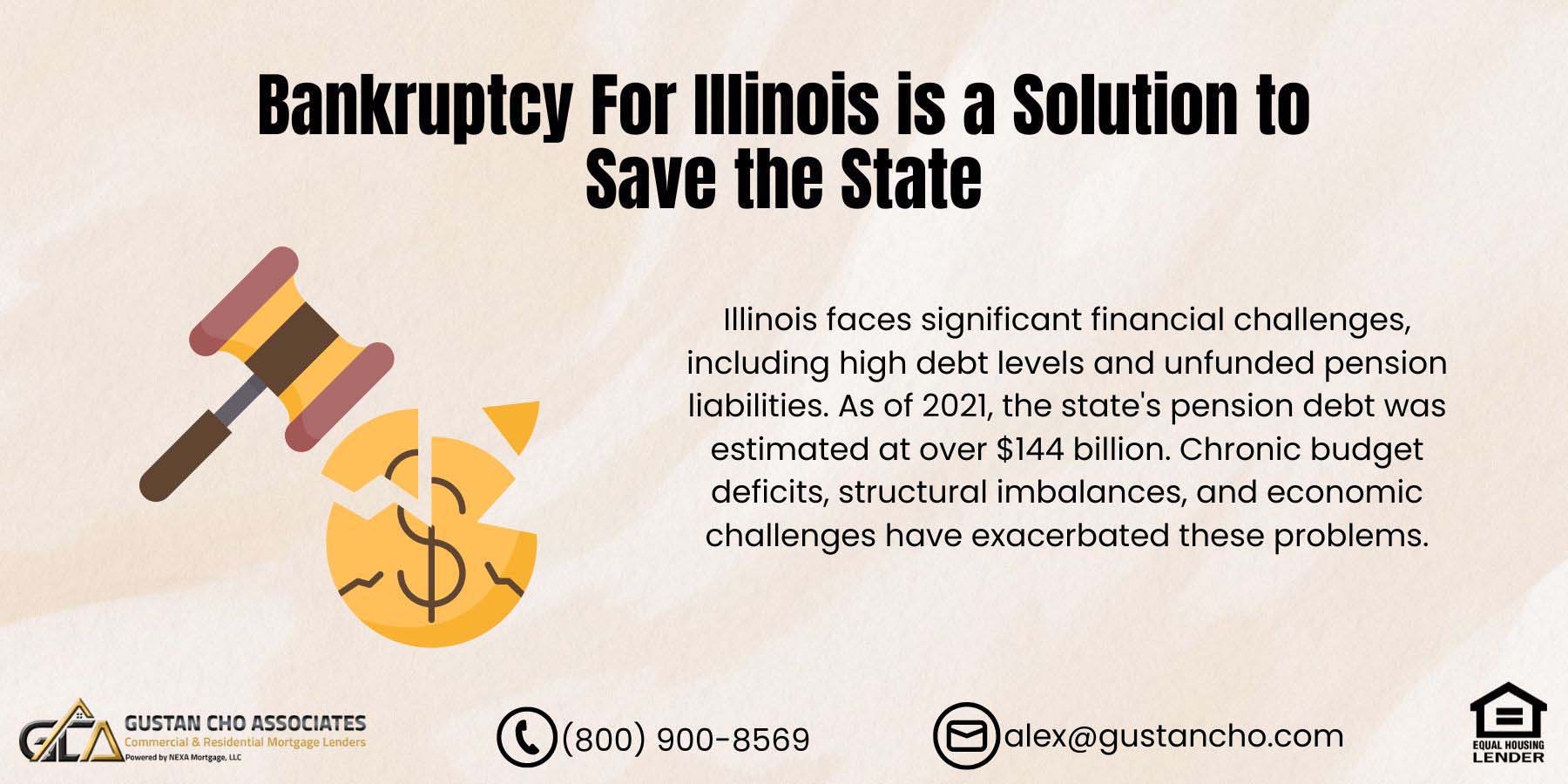This guide covers bankruptcy for Illinois may be a possible solution to save the state. Bankruptcy for Illinois may be an option for the state due to their many years of financial mismanagement. Illinois, along with a few other states, has been struggling with budget deficits for many years. Prior to the coronavirus pandemic, the U.S. economy was stronger than ever. Most states have enjoyed growth and substantial surplus due to the strong economy
Neighboring states like Indiana, Ohio, Kentucky, Tennessee, Wisconsin, Michigan, Iowa had strong economic growth and had a budget surplus. However, Illinois was struggling like never before.
Illinois Governor J.B. Pritzker has been losing popularity due to his pro-tax policies in trying to fix the financial crisis of Illinois. Pritzker doubled the gas tax in Illinois, and not only has raised taxes on over 20 line items but also created new taxes. J.B. Pritzker is pushing to changing the current flat tax to a progressive tax system. He has been lobbying strongly for Illinois to become a progressive tax state. In the meantime, countless businesses and individual taxpayers are fleeing Illinois to other lower-taxed states.
Is Bankruptcy For Illinois a Solution?
State bankruptcy has been proposed as a potential solution to address Illinois’ severe financial challenges. However, it’s a complex and controversial topic with significant legal, economic, and political implications. Here’s an analysis of whether bankruptcy could save Illinois, supported by multiple sources:
Current Financial Situation of Illinois
Illinois faces substantial financial problems, including high debt levels and unfunded pension liabilities. As of 2021, the state’s pension debt was estimated to be over $144 billion. Illinois has struggled with chronic budget deficits for years, exacerbated by structural imbalances and economic challenges. Under current federal law, states cannot file for bankruptcy. Bankruptcy options are available for municipalities under Chapter 9 of the Bankruptcy Code, but there is no provision for state bankruptcy.
Legislative Changes Needed
For Illinois to declare bankruptcy, Congress must pass new legislation allowing states to file for bankruptcy. This would be an unprecedented move with significant legal hurdles and political opposition.
Economic and Political Implications
Debt Restructuring: Bankruptcy could allow Illinois to restructure its debts and pension liabilities, providing a pathway to financial stability. Fresh Start: It could offer Illinois a fresh start by addressing unsustainable financial obligations constraining its budget.
Cons of State Bankruptcy
Market Impact: Allowing states to declare bankruptcy could undermine investor confidence in state bonds, leading to higher borrowing costs for Illinois and other states. Political Feasibility: State bankruptcy legislation is likely to be met with significant political opposition, both from those who view it as a failure of state governance and from stakeholders who stand to lose from debt restructuring, such as bondholders and pensioners.
Impact on Services on Bankruptcy For Illinois
The bankruptcy process could disrupt state services and lead to severe cuts in public spending, affecting education, healthcare, and other essential services.
Alternatives to Bankruptcy For Illinois
Meaningful pension reform could help address one of the state’s largest financial burdens. This could include changes to benefits, increased contributions, or other structural reforms. Comprehensive tax reform and more efficient government spending could help balance the budget. This might involve broadening the tax base, reducing tax rates, and cutting unnecessary expenditures. While politically contentious, federal aid or bailout options could provide immediate relief to help stabilize Illinois’ finances.
Ready to Buy a Home in Illinois? Let Us Help You Find the Best Mortgage Rates!
Contact us today to explore your mortgage options and get pre-approved.
Illinois is Second as the State With Highest Property Taxes
Many critics of freshman governor Pritzker blame inexperience and incompetence for his pro-tax ideology. More and more Illinoisans are becoming worried about Pritzker’s actions. Raising and increasing taxes is one way of increasing revenues. However, the freshman governor seems to keep on spending and has no intention of cutting spending.
After the pandemic, the state may be near bankruptcy. J.B. Pritzker has been hinting for the federal government to bail the state out. The federal government has absolutely no interest in bailing financially mismanaged states like Illinois.
JB Pritzker has recently approved a $261 million pay raise for high-level state workers. Pritzker also approved salary increases for state lawmakers. Illinois was facing a major financial crisis due to its pension fund shortage prior to the coronavirus pandemic. Illinois ranks as one of the states with the highest taxes. llinois ranks are in second position with the highest property taxes. In this breaking news article, we will discuss and cover the question of can bankruptcy for Illinois may be a possible solution to save the state.
Illinois has more businesses and taxpayers leaving the state due to high taxes
McConnell Suggests Bankruptcy For Illinois And Other Financially Mismanaged States
J.B. Pritzker has been hinting the federal government bailout Illinois’s dysfunctional pension system due to the coronavirus pandemic.. Pritzker has been trying to include the state’s financial deficit as part of the federal coronavirus pandemic economic relief aid. Not so fast said Senate Majority Leader Mitch McConnell. The Kentucky senior senator presented that bankruptcy for Illinois and Chicago could save the financially strapped state. However, Democrats did not like the idea of bankruptcy for Illinois. Pritzker said bankruptcy for Illinois is out of the question. Many state Democrats agreed. McConnell and the Trump Administration thought the idea of bailing out the state and the city of Chicago due to their financial irresponsibilities is out of the question.
Other Solutions vs Bankruptcy For Illinois
While bankruptcy could theoretically provide a mechanism for Illinois to address its financial woes, it is not currently legal, requires significant legislative changes, and carries substantial risks. The state might instead focus on pension reform, fiscal discipline, and seeking federal assistance as more practical solutions. The debate over state bankruptcy reflects broader fiscal responsibility and governance issues in Illinois and across the United States.
Illinois has been running on a deficit year after year. The main reason is financial mismanagement. Many lawmakers do not realize it is not how much revenue you take in but rather how much you spend. It is basic economics and math 101.
Unfortunately, Pritzker and the state’s Democrats do not realize this and keep on raising taxes and spending more money. Illinois had financial problems even prior to the pandemic outbreak while other states like Indiana, Kentucky, Tennessee, Georgia, Texas, Florida, and countless others were thriving with hefty reserves. There is no doubt the coronavirus pandemic has hurt all states financially. However, Illinois and a few other states, the pandemic has devasted their state where bankruptcy is a viable option for them to get back on their feet.
Pritzker’s Solution To Solve Illinois’ Financial Crisis
Illinoisans had high hopes when J.B. Pritzker got elected. However, within months, many Illinoisans had voter’s remorse. Illinoisans figured that Pritzker was a great businessman due to being a billionaire heir to the Hyatt Hotel chain. People thought with his business expertise, the new freshman governor can turn things around for Illinois. Unfortunately, it seems the competence and business experience backfired
It seemed like Pritzker had no business knowledge and was narrow-minded. His main solution in fixing the state’s finances was to not just raise taxes but create new taxes. Pritzker doubled Illinois gas tax while signing a bill for wage increases to state lawmakers
Pritzker just gave pay raises totaling $261 million to high-level state employees. Pritzker is proposing changing the current state’s flat tax to a progressive tax system. Economists and analysts predict changing the state’s tax system to a progressive tax system will create a flood of wealthy and high-income earners to flee Illinois to other lower-taxed states. Many critics feel Pritzker is a major liability for Illinois and is clueless and lost and needs to be replaced immediately. While other governors are thinking of reducing and cutting taxes, Pritzker is the opposite. He wants to raise and increase taxes even during the coronavirus pandemic crisis.
Looking for a Mortgage in Illinois? We Offer Competitive Rates and Personalized Service!
Reach out now to discuss your needs and find the best mortgage solution for you.
Why Bankruptcy For Illinois is Inevitable
Pritzker and state lawmakers have no intention of cutting spending. They keep on raising taxes on businesses and Illinois. Illinois is one of the top states where there is a flood of businesses and taxpayers fleeing to other lower-taxed states. Neighboring Indiana is thriving due to the mass migration of businesses and residents from Illinois. Indiana has very low taxes and is enjoying a healthy economy and a huge budget surplus.
Alex Carlucci of Gustan Cho Associates has been studying the mass out-migration of Illinoisans. J.B. Pritzker said bankruptcy for Illinois is out of the question. Pritzker said he will not consider bankruptcy for Illinois.
JB Pritzker said it is the duty of the federal government to aid Illinois during time of a national financial emergency. The federal government is helping all states and taxpayers only economic damage due to the coronavirus. The federal government will NOT help states like Illinois due to financial irresponsibility and mismanagement.
No Way Out But Bankruptcy For Illinois
As mentioned earlier, the U.S. economy was stronger than ever prior to the coronavirus pandemic. Most state governments were thriving. Indiana was taking in floods of Illinoisans due to the state’s low taxes and lower cost of living. Property taxes in Indiana are a third of a comparable home in Illinois. The Republican-led state is still in a strong position than its neighbor Illinois. Dale Elenteny of Gustan Cho Associates is a bankruptcy expert and has been following Illinois’s financial irresponsibility and mismanagement.
Bankruptcy for Illinois is not the end of the world. It is not the first time city, county, state government contemplated bankruptcy. Detroit, Michigan was under financial crisis just like Chicago is today.
Due to Detroit filing bankruptcy and reorganizing, the city has a second chance. The city came back stronger than ever after bankruptcy. Using Detroit’s model, bankruptcy may save Chicago. Chicago is the highest taxed major city in the United States. Due to financial irresponsibility and incompetent politicians, the city is in a major financial crisis.
Pritzker Confident The Federal Government Will Bail Illinois Due To Coronavirus Pandemic
Illinois, as well as other states, will be getting billions of dollars in federal aid due to the coronavirus pandemic impact on the economy. However, J.B. Pritzker is trying to sneak in the major pension debt shortage as part of the coronavirus pandemic assistance request. Pritzker may think he is sly but it is not going to work. New York, Illinois, and a handful of other states are states with mismanaged finances.
While Pritzker is asking billions of dollars in aid, he is slamming President Trump at the same time. Not a smart move for the Illinois governor. Illinois pension debt is over $250 billion with the numbers substantially increasing year after year.
However, the federal government will not be assisting states who have financially mismanaged their finances. Gustan Cho Associates News & Media Division said the following: Pritzker is pushing for a progressive income tax for Illinois. However, many economists feel a progressive income tax in Illinois will turbo-boost Illinois’ road to bankruptcy.
Considering a Mortgage in Illinois? Let Us Guide You Through the Process!
Reach out now to discuss your needs and find the best mortgage solution for you.
Politics Versus The Best Interest For Financially Stressed States
Illinois and New York are the top two states in deep financial crisis. Experts say that raising taxes normally backfire on states that are under financial distress. Ego and not having an open mind is what is driving Illinois, New York, and other states in financial distress. The key is to attract new businesses and taxpayers for states to be financially strong.
No new businesses or individual taxpayers will be moving to states like Illinois with high taxes. Many police officers, firefighters, and public service workers often leave Illinois once they retire from the government jobs to other states with lower taxes. This is a double whammy for Illinois.
This is a breaking story updated on May 25th, 2024. Gustan Cho Associates will keep our viewers updated on new developments in the coming days and weeks.
FAQs: Bankruptcy For Illinois is a Solution to Save the State
- 1. What is Illinois’ current financial situation? Illinois faces significant financial challenges, including high debt levels and unfunded pension liabilities. As of 2021, the state’s pension debt was estimated at over $144 billion. Chronic budget deficits, structural imbalances, and economic challenges have exacerbated these problems.
- 2. Can Illinois file for bankruptcy? Under current federal law, states cannot file for bankruptcy. While municipalities can file under Chapter 9 of the Bankruptcy Code, state bankruptcy is not provided.
- 3. What legislative changes are needed for state bankruptcy? For Illinois to declare bankruptcy, Congress must pass new legislation allowing states to file for bankruptcy. This would be an unprecedented move with significant legal and political hurdles.
- 4. What are the economic and political implications of state bankruptcy? If Illinois were allowed to declare bankruptcy, it could present an opportunity for the state to restructure its debts and pension liabilities, potentially paving the way to financial stability. However, such a move could significantly impact the market, potentially undermining investor confidence in state bonds and leading to higher borrowing costs. Politically, state bankruptcy could encounter substantial resistance from critics, bondholders, and pensioners.
- 5. How would bankruptcy impact state services in Illinois? The bankruptcy process could disrupt state services and lead to severe cuts in public spending, affecting education, healthcare, and other essential services.
- 6. What alternatives to bankruptcy exist for Illinois? Exploring alternatives to bankruptcy for Illinois involves a few strategies. Pension reform is crucial, involving changes to benefits, increased contributions, or other structural adjustments to address one of the state’s largest financial burdens. Additionally, comprehensive tax reform combined with more efficient government spending could aid in balancing the budget by broadening the tax base, reducing tax rates, and eliminating unnecessary expenditures. Although it may be politically contentious, seeking federal aid or bailout options could offer immediate relief and help stabilize Illinois’ finances.
- 7. Why is Illinois’s governor, J.B. Pritzker, unpopular? Governor J.B. Pritzker has implemented several pro-tax policies, including doubling the gas tax and raising taxes on over 20 line items. He also pushes to change the current flat tax to a progressive tax system. These measures and continued spending increases have led to a mass exodus of businesses and individual taxpayers to lower-tax states.
- 8. What impact has the coronavirus pandemic had on Illinois’s financial situation? The coronavirus pandemic has exacerbated Illinois’s financial crisis, leading Governor Pritzker to seek a federal bailout for the state’s dysfunctional pension system. However, the federal government is reluctant to assist financially mismanaged states like Illinois.
- 9. What are the arguments for and against bankruptcy for Illinois? Considering the arguments for and against bankruptcy for Illinois, filing for bankruptcy could offer the state a fresh start by allowing it to address its unsustainable financial obligations. This move might also assist in restructuring debts and pension liabilities. On the other hand, declaring bankruptcy could undermine investor confidence in state bonds and will likely encounter significant political opposition. Additionally, it could result in severe cuts to public services.
- 10. Why are businesses and taxpayers leaving Illinois? High taxes and ongoing financial mismanagement drive businesses and taxpayers to neighboring states with lower taxes and more stable economies. This out-migration further exacerbates Illinois’s financial woes.
- 11. What is the likelihood of Illinois declaring bankruptcy? While bankruptcy could theoretically provide a mechanism for Illinois to address its financial issues, it is not currently legal and requires significant legislative changes. Given the substantial risks and opposition, the state might instead focus on pension reform, fiscal discipline, and seeking federal assistance as more practical solutions.
Ready to Secure a Mortgage in Illinois? We Make the Process Simple and Straightforward!
Reach out now to get started and take the first step toward homeownership.










